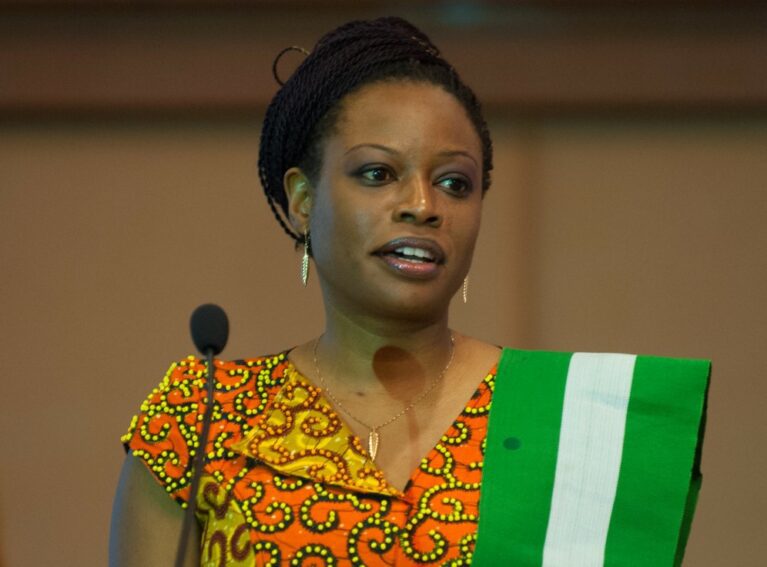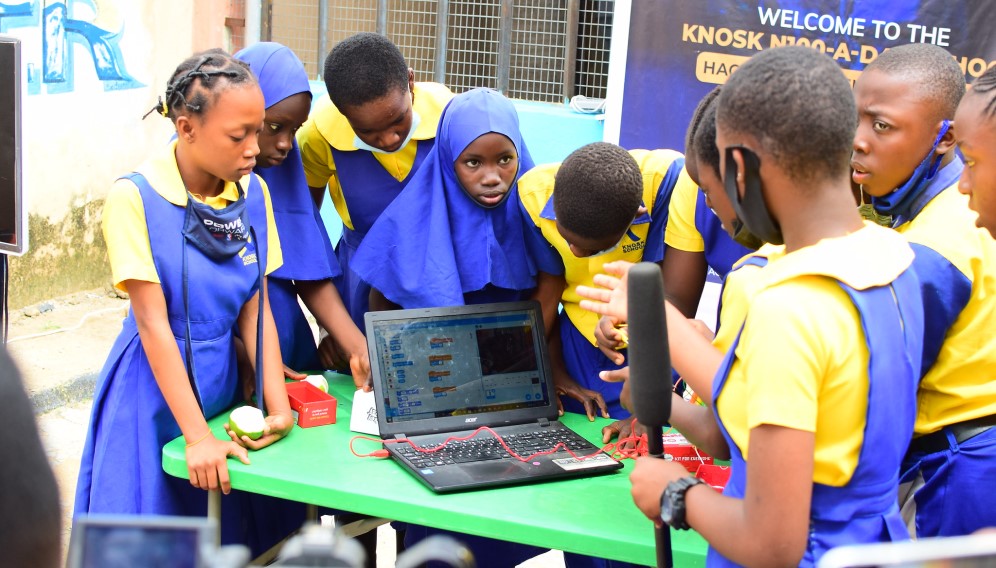By: Charles Pensulo
Send to a friend
The details you provide on this page will not be used to send unsolicited email, and will not be sold to a 3rd party. See privacy policy.
When Unoma Okorafor first stepped foot into university in Nigeria, she was an eager student. But threats of violence from a peer pushed her from the front of the class to the back. The experience left Okorafor more determined than ever to create space for girls and women in science and technology education in Africa.
Today, Okorafor has helped thousands of girls and young women to pursue careers in science, technology, engineering and mathematics (STEM), through her organisation Working to Advance African Women. Now based in the United States, where she obtained a PhD in computer engineering, Okorafor tells SciDev.Net why mentoring girls can create the researchers of the future.

Unoma Okorafor, Nigerian computer scientist and founder of Working to Advance African Women foundation, speaks at the Gem Tech Awards 2016.
Tell me about your life story. What motivated you to create the Working to Advance African Women (WAAW) foundation?
I grew up in a small university town in Nigeria. Both my father and my mother were in the academic field. One of the biggest messages I got growing up was that I could do anything. That’s a very critical message, especially coming from my dad. I went to an all-girls school and I think that was very critical because in an all-girls school, I did not know that I was female, all I knew was that I loved math, I loved the sciences, I wanted to be an engineer.
It was when I got into the university [in Lagos] that I realised for the first time that I was female. I used to sit at the front of the class at the very beginning, answering questions, until somebody told me ‘it looks like you’re a smart aleck, the boys in the class don’t like that you’re always answering questions’ … and actually threatened me with sexual violence. And it was at that point, after my very first semester, that … I changed my whole strategy, I started to sit at the back, never would talk in class anymore. In a class of over 100, there were very few girls. The girls were sort of told to take a back seat and just, really, be amiable.
Years later, when I was in the US getting my PhD, I did not realise how hurt I had been by that experience. And it was that pain and the anger coming from that, those were one of the motivations that led to the founding of WAAW foundation. I thought, this should not be. Girls are told that they should be seen and not heard, that their place is really in the kitchen or in the family room … when you attempt to show your head or sit at the table, especially in a male-dominated field like engineering, like in the STEM fields, the message is often: ‘What are you doing here? Please be polite, please be quiet.’
You launched the organisation with savings that you made as a graduate student. That must have been a courageous thing to do.
My husband was also a graduate student, we had very little means — at that point I already had two children. But, the passion and the mission were burning in my heart, I could see that technology was coming to change the world. I knew the power and impact, the hard-working nature of women across Africa. I knew that there were smart people across Africa, smart, young girls. My goal was to help one girl, I thought, if we can impact one girl it makes a difference. At the very beginning we set out [to launch] scholarships, we launched our very first scholarship in January of 2007.
Between my husband and I, we were able to scrape up US$500 because we had done the research and found that $500 could easily sponsor the tuition, the expenses for one girl in an African university for one year. We put out a call and we were blown away and amazed — we received over 1,000 applications for one single scholarship. And that’s when it dawned on me, nobody was paying attention to girls in Africa, especially college girls and in particular college girls who were doing STEM-related fields.
Why is it important that we should have women in STEM and in STEM research?
Women are half of the population, if we leave them behind we are leaving out half of our workforce, half of the ability that we have. Women bring energy in a different dimension to the table. Women are intuitive, they are innovative, they are creative. Women like to work in groups, and they like to solve relevant problems that are touching their lives and the lives of their communities. So, when women come to the table, and sit down and start to talk about research in STEM, they bring new perspectives, insight, that can really escalate the speed to which we innovate.
What is your advice to girls who want to pursue a career in science but are not sure of their capabilities and opportunities that may open up for them?
Take time to find your passion. If you have an interest in STEM, one of the first things I usually encourage girls is, find a role model. Find another lady who’s in STEM and reach out to them, connect to them and ask. Many women in STEM are becoming aware of the need to mentor. The other thing is to be courageous, don’t give up. When I was going through my own career, I can tell you it was very lonely. I can understand that being the only woman, perhaps being the only woman of colour, the only black person in the room, you feel out of place. But, don’t stop. At the end of the tunnel there is always beautiful light.
Well-behaved women rarely make history — this is one of my favourite quotes, I have it on my wall. Ladies, if we are going to break the glass ceiling, if we are going to walk the path less travelled, we have to break some of the rules. For us to make history, we really have to think outside the box and take charge of these situations.
What are the latest projects or initiatives that you have in the pipeline?
We are expanding into the African Women Engineering Leadership and Entrepreneurship Academy. That is a two-year programme that we’re building out pretty much like a tech school for girls, with its own university and its own campus. Our goal is to hone in on research for girls — people who want to go into STEM research and academia, who want to take it to the next level and do research on the continent around STEM.
This interview has been edited for clarity and brevity.














